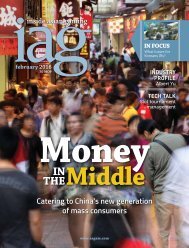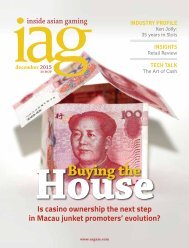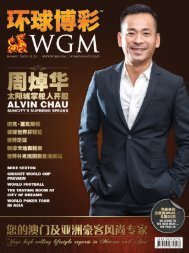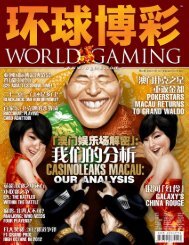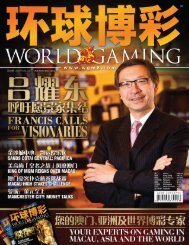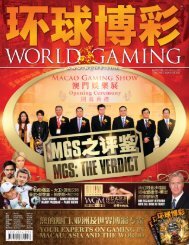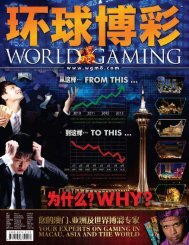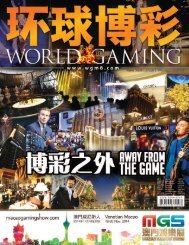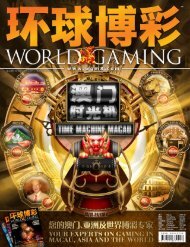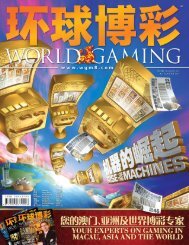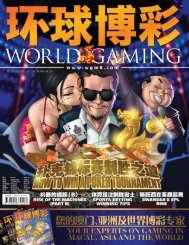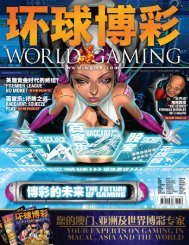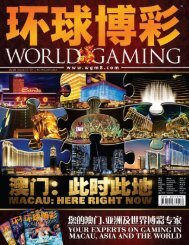WGM#38 NOV/DEC 2015
The Macau gaming industry is synonymous with junkets. First started by none other than Stanley Ho in the 1960s, these junkets and the VIP gamblers they provide have played a vital role in Macau’s rise over the past decade. However, the recent downturn has changed the landscape in this unique part of the world with the junket business suffering more than any other and a number of VIP rooms being forced to close in Macau over the past 12 months. So what does the future hold? In this issue of WGM, we speak exclusively to the Chairman of one of Macau’s biggest junket operators Tak Chun Group, Mr Levo Chan, about the current gaming climate, his expectations for the coming years and why Tak Chun has expanded while other junkets have slowed right down. Poker fans will enjoy our lengthy and intriguing interview with World Series of Poker (WSOP) Tournament Director Jack Effel who explains just how much goes into organizing the world’s biggest tournament series each and every year as well as regaling us with some of his favorite stories from the past. We tackle the smoking debate as Macau’s legislators decide whether to allow smoking in specially designated smoking lounges or ban the habit altogether, while our responsible gambling series sees us visit one of Macau’s main problem gambling treatment centres. In sport, we look at Manchester United’s big gamble on teen star Anthony Martial as well as examining which of the world’s major sports would benefit most from cracking the lucrative Chinese market. And our resident party animal tells us all about one of Macau’s newest trendy nightspots – Ritz-Carlton Bar & Lounge.
The Macau gaming industry is synonymous with junkets. First started by none other than Stanley Ho in the 1960s, these junkets and the VIP gamblers they provide have played a vital role in Macau’s rise over the past decade.
However, the recent downturn has changed the landscape in this unique part of the world with the junket business suffering more than any other and a number of VIP rooms being forced to close in Macau over the past 12 months. So what does the future hold? In this issue of WGM, we speak exclusively to the Chairman of one of Macau’s biggest junket operators Tak Chun Group, Mr Levo Chan, about the current gaming climate, his expectations for the coming years and why Tak Chun has expanded while other junkets have slowed right down.
Poker fans will enjoy our lengthy and intriguing interview with World Series of Poker (WSOP) Tournament Director Jack Effel who explains just how much goes into organizing the world’s biggest tournament series each and every year as well as regaling us with some of his favorite stories from the past.
We tackle the smoking debate as Macau’s legislators decide whether to allow smoking in specially designated smoking lounges or ban the habit altogether, while our responsible gambling series sees us visit one of Macau’s main problem gambling treatment centres.
In sport, we look at Manchester United’s big gamble on teen star Anthony Martial as well as examining which of the world’s major sports would benefit most from cracking the lucrative Chinese market.
And our resident party animal tells us all about one of Macau’s newest trendy nightspots – Ritz-Carlton Bar & Lounge.
Create successful ePaper yourself
Turn your PDF publications into a flip-book with our unique Google optimized e-Paper software.
Tak Chun’s Levo Chan 德 晋 之 陈 荣 炼<br />
Andrew W Scott: Mr Chan, first of all we here at WGM<br />
would like to thank you very much for agreeing to sit down and speak<br />
with us. We’re aware this is the first interview you’ve done in over five<br />
years so thank you for choosing WGM. Let’s start at the beginning. Can<br />
you tell us a bit about your background? Where did you grow up?<br />
Levo Chan: I was originally from Jinjiang City, Fujian Province.<br />
After graduating from primary school I came to live in Macau with my<br />
family and I finished my study here in Macau. When I first came to Macau<br />
it was difficult to find a school because I didn’t speak Cantonese so I had<br />
to learn the language before I was successfully admitted to a school and<br />
completed my study.<br />
When I was a kid, I lived in Areia Preta. At that time, people<br />
who lived in Areia Preta were poor so they were very diligent.<br />
However, back then most of the Fujian people gathered there, so<br />
Areia Preta was like a little Fujian. Everyone spoke the hometown<br />
dialect and they were very simple people which helped me feel<br />
very warm.<br />
AWS: How did you first get into the VIP business?<br />
LC: In the 1980s and 1990s the industries most popular with<br />
Macau graduates were civil servants, real estate or the casino<br />
industry. At that time, the Macau VIP business had just started<br />
but when I finished my education I expected this industry to have<br />
great development so I started to get involved. I started from<br />
scratch and witnessed the take-off of the VIP business.<br />
AWS: What are your memories of the VIP industry back then?<br />
How many operators were there and how does it compare the VIP<br />
business today?<br />
LC: In 2002 before the liberalization of the gaming industry,<br />
there was only one company holding a gaming license (STDM)<br />
and VIP rooms were all at Lisboa casino. Back then opening a<br />
VIP room required strong network connections and STDM’s<br />
approval, so there was a certain degree of difference between the<br />
VIP business at that time and the current model. It was also very<br />
different in terms of its source of customers. The main customers<br />
were from Taiwan, Hong Kong and Japan, while Mainland China<br />
only accounted for a small proportion. It was different in terms of<br />
customers opening accounts too. Back then, customers had to be<br />
introduced by someone they knew in order to open an account in<br />
the VIP room. Under the current model they can instantly open an<br />
account. In addition, the junket business was all operated by local<br />
people back then. It was hard for them to open an account in the<br />
VIP room, VIP rooms wouldn’t provide a credit service to them and<br />
commission was only around half of what it is now. Therefore, there<br />
was no risk of bad debts, the commission was low, plus there were<br />
less competitors so the VIP rooms at that time were more profitable<br />
and easier to manage.<br />
AWS: Can you tell us a bit about Tak Chun – how and where<br />
did it start? How does it want to be positioned and known in the<br />
Macau gaming industry and the wider community?<br />
LC: After the liberalization of the Macau gaming industry, the VIP<br />
business was in the incubation stage before explosion. I foresaw<br />
<strong>2015</strong> 年 5 月 23 日 , 约 30 多 位 义 工 在 昆 明 红 土 地 镇 参 与 德 晋 第 一 、 第 二 、 第 三 小 学<br />
揭 牌 仪 式 , 受 助 学 生 及 职 员 逾 450 人 , 助 养 计 划 学 生 逾 100 人 。<br />
Around 30 volunteers participated in the opening ceremony for the first, second and<br />
third Tak Chun primary schools in Hongtudizhen, Kunming, on 23 May <strong>2015</strong>. Around<br />
450 students and staff were assisted and more than 100 students were sponsored<br />
through Tak Chun’s child sponsorship plan.<br />
25



